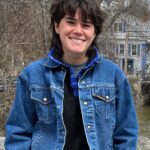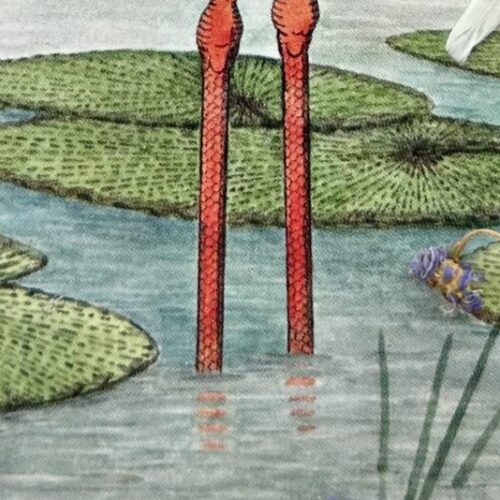A small bottle of dust sits on my grandfather’s desk, fractals of pale blue and silver catching the sunlight. It’s got a yellowing label on it: moondust. His desk is in the attic, facing the window to his backyard. I can see the old greenhouse from here, where he used to maintain his cacti and press tomato seeds into damp trays of earth. I can see his hands working now, even after death. The sunlight drifts through the window, lighting the years of grit between the floorboards.
My grandmother passed ten years before he did, and her childhood dolls sit in a box, smiling at me. Their hair is falling out, their smiles seem weakened. I can’t help but smile back, maybe offer them some company in this quiet place.
I pocket the bottle into my black jeans and go down the stairs, whose carpet I slipped on many times as a child. It’s strange to walk through the house now, running through the ghosts of my memory. The ghosts of my seven-year-old self, the ghosts of my grandparents, the ghosts of my cousins who’ve moved away.
Mom looks at me from the kitchen, where she’s still in her funeral dress, wrapping retro orange juice glasses in newspapers dated a decade before. She looks at me and smiles the way I smiled at the dolls, not quite present. Like we’re strangers passing on a street. As though we’re not packing up nine decades of life on a regular Tuesday night.
I look out to the backyard, “Remember when Gramps said the apples were poisonous if we ate them too early?”
Mom nods. “He was always telling lies. Even when I was a girl.”
I chew on my lip. I glance outside. The apples are black with rot, scattered in the grass.
It’s too late in the season to pick anything now. Flies butt against the screen door, persistent and stupid, like they’re sure something sweeter is waiting for them inside the house.
“When I was young,” Mom says, pressing paper into a glass, “he told me he was alive for Abraham Lincoln’s assassination.”
I let out a meek laugh.
She rolls her eyes. “Sitting right below him in the theater.”
I push my hand into the pocket of my jeans, feeling the cold glass against my fingers, the softness of the cork lid. I fish out the bottle and show it to Mom, “How’d he get this?”
She looks at the bottle for a long time and doesn’t say anything. Then, as though she’s remembering something, she smiles and looks away. “Don’t open it.”
“Why not? Isn’t it cool, collecting a little bit of dust from something hundreds of thousands of miles away?”
“Those are Buddy’s ashes.” Mom cringes, her grasp tightening around newspapers. “His favorite dog.”
I freeze. I want to drop the bottle, but I don’t want to send Buddy flying into the kitchen grout. I don’t want him going head-first, but honestly, I don’t know what part of Buddy is in the bottle. Or what direction he’s facing anymore.
“He passed away when Aunt Jessi and I were children. Dad didn’t want us to be sad, so he gave us each a bottle of Buddy and told us it was a mix of Buddy and the moon. He said when we squint at the moon long enough, we’ll see Buddy looking down at us. I guess he kept some for himself, too.”
When the sun goes down, we eat drunken noodles and spring rolls on the back porch. We talk about Gramps’s childhood, the things that were true, the lies, and everything in between, where reality could be softened, bent a little, shaped into something kinder.
After dinner, Mom heads inside to make tea, but I linger behind in the calmness of the night.
The warped porch boards creak softly under my heels as I tilt my head back and stare up at the low, pale moon. I squint. I don’t see Buddy. I want to see him. I keep squinting until the craters blur and seem to rearrange before my eyes.

Lauren Robertson
Lauren Robertson is a queer writer based in the Southeastern U.S. She has farmed in California and Vermont, and now works at a farming nonprofit in North Carolina. Passionate about nourishing the land and soul through her work, she has been published by Moonstone Arts Center, 1922 Review, The Raven Review, Bryant Literary Review, and Disco Kitchen Magazine.



